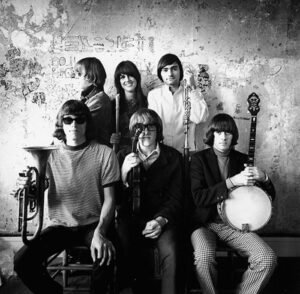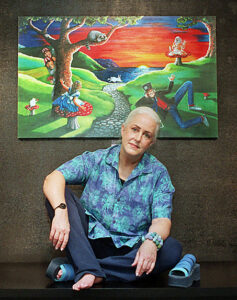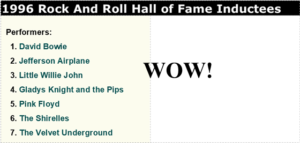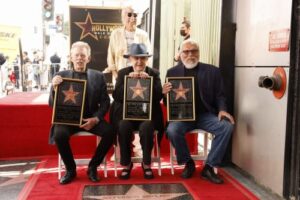

One pill makes you larger
And one pill makes you small,
And the ones that mother gives you
Don’t do anything at all.
Go ask Alice
When she’s ten feet tall.
And if you go chasing rabbits
And you know you’re going to fall,
Tell ’em a hookah smoking caterpillar
Has given you the call.
Call Alice
When she was just small
When the men on the chessboard
Get up and tell you where to go
And you’ve just had some kind of mushroom
And your mind is moving low.
Go ask Alice
I think she’ll know.
When logic and proportion
Have fallen softly dead
And the White Knight is talking backwards
And the Red Queen’s “off with her head!”
Remember what the dormouse said:
“Feed your head! Feed your head!”
Grace Slick,
to the public mind, is synonymous with Jefferson Airplane and Jefferson Starship in the way that Mick Jagger is synonymous with the Rolling Stones. Ironically, Grace was not an original member of the band, nor was she with Starship at the very end. But Grace’s importance to every phase of the band cannot be underestimated. White Rabbit, which she wrote, helped define not only Jefferson Airplane but also the acid rock era. Her unconventional vocals on Somebody to Love gave the Airplane its biggest hit. As one of the first female rock stars (as opposed to pop singers), Grace helped redefine women’s role in modern music as more than just a sex symbol backed by a band. Of course, with her statuesque beauty and icy blue eyes, Grace had the sex symbol bit down pat as well.
Grace Barnett Wing was born October 30, 1939, in Highland Park, a suburb of Chicago, IL. Her father, Ivan, was an investment banker, and her mother, Virginia Barnett Wing, had been an actress and singer in the early ’30s. Her lineage goes back to Norway, where the family name was Vinje.
Grace attended Finch College, a prestigious finishing school for girls, in New York (1957-58), before transferring to the University of Miami (1958-59), where she majored in art. She tried her hand at various odd jobs and even auditioned as a singer at a black record label. But although she modeled for I. Magnin’s department store from 1960-63, Grace later said she had no ambitions beyond being a housewife. On August 26, 1961, she married Gerald “Jerry” Slick, a film student and later a successful cinematographer. She later described the marriage as passionless and the result of “cultural imposition.” But it was during this marriage that she wrote her first song — a piece for one of Jerry’s film projects.
In August 1965, Grace read an article in the San Francisco Chronicle about a new band called Jefferson Airplane. A week later, she and Jerry checked out the band at the Matrix. Deciding that being in a rock band looked like a lot of fun and paid better than modeling, Grace and Jerry soon formed their own band, the Great Society. Jerry played drums, and his brother Darby Slick joined on guitar. With the lineup completed by David Minor (guitar/vocals), the Great Society made its debut at the Coffee Gallery in San Francisco’s North Beach section on October 15, 1965.
Despite her rather late entry into rock ‘n’ roll, Grace proved herself a talented singer. She attempted to imitate the sound of an electric guitar and developed a unique and forceful singing style. She also discovered a knack for writing songs — White Rabbit was one of her first compositions.
Grace has always said that White Rabbit was intended as a slap toward parents who read their children stories such as Alice in Wonderland (in which Alice uses several drug-like substances in order to change herself) and then wondered why their children grew up to do drugs. For Grace and others in the ’60s, drugs were an inevitable part of mind-expanding and social experimentation. With its enigmatic lyrics, White Rabbit became one of the first songs to sneak drug references past censors on the radio. Even Marty Balin, Grace’s eventual rival in the Airplane, regarded the song as a “masterpiece.”
In 1966, one Sylvester Stewart (the future Sly of Sly and the Family Stone) walked out as the band’s producer of a demo after it took the band 50 takes to get one song right. However, Grace’s talent carried the band, and they found themselves opening for Jefferson Airplane and other successful, local bands. Columbia Records even offered the Great Society a recording contract (and would release two albums by the band after Grace found fame), but, by the time the contract arrived in the mail, the Great Society was no more.
 In September 1966, the Airplane put bassist Jack Casady up to asking Grace if she might be interested in joining them. For Grace, it was a no-brainer; the Airplane had already released an album and seemed on the verge of a major breakthrough. After discussing the matter with her husband (one of the last times, it seems, that Grace would take his opinion into consideration), she accepted the Airplane’s offer. Bill Thompson, then the Airplane’s road manager, would buy out Grace’s contract from her manager for the paltry sum of $750.
In September 1966, the Airplane put bassist Jack Casady up to asking Grace if she might be interested in joining them. For Grace, it was a no-brainer; the Airplane had already released an album and seemed on the verge of a major breakthrough. After discussing the matter with her husband (one of the last times, it seems, that Grace would take his opinion into consideration), she accepted the Airplane’s offer. Bill Thompson, then the Airplane’s road manager, would buy out Grace’s contract from her manager for the paltry sum of $750.
Following Signe Anderson’s final gigs with the Airplane in mid-October, Grace became the band’s new female singer. She would later recall that she was “scared shitless” — she barely knew the words, but it didn’t matter, for the Airplane played far louder than she expected.
After such an inauspicious debut, Grace barely had time to get comfortable with the Airplane before the band went to Los Angeles to record its second album, Surrealistic Pillow. She did contribute two stand-out cuts from the Great Society — White Rabbit and Darby Slick’s Somebody to Love. Though the Airplane recognized those songs as special, even they had little inkling as to how popular they would become. Nine months after she joined the band, Grace found herself a star as the lead singer of the band’s two top ten hits.
Grace Slick quickly emerged as an icon of the psychedelic scene that followed. She always downplayed her own significance in the press, suggesting that she got the most attention because she was the only woman in the band. But such comments disregard Grace’s obvious talents and extroverted personality. She would literally say and do anything. While appearing on the Smothers Brothers Comedy Hour in 1968, she wore blackface and raised her fist in a Black Panther salute. During one rainy outdoors concert, she performed topless rather than getting her blouse wet. On another occasion, she drunkenly referred to a wealthy audience as “filthy jewels” (a comment misheard by some as “filthy Jews”). In her autobiography, Grace said she learned “how to let it out and damn the censorship” from Mick Jagger. Unfortunately, much of her behavior was also attributed to her increasing addiction to alcohol.
By early 1967, Grace’s marriage to Jerry was all but over, though they didn’t divorce until 1971. She had a brief dalliance with Jack Casady, then began a two-year affair with Airplane drummer Spencer Dryden. Grace felt an immediate connection with Spencer, since they were both initially “outsiders.” Once Grace became famous, however, Spencer would use their relationship to get his way within the band.
With the Airplane, Grace apparently regarded herself as an equal among equals who could write anything she damn well pleased. Her songs were psychedelic interpretations of literary classics (Rejoyce, 1967), attacked middle class repression (Greasy Heart, 1968), and assaulted human arrogance (Eskimo Blue Day — noted for the line, “the human name doesn’t mean shit to a tree” — 1969). On the occasion of Spencer’s 30th birthday, she wrote Lather (1968), a song expressing the anxieties of growing older — a theme she would revisit on several occasions.
By 1969, her relationship with Spencer had ended, and she soon became involved with Paul Kantner. Though they never married, Grace decided that she wanted to have Paul’s child. Their daughter, China, was born on January 25, 1971. (In typical Grace fashion, she initially told the press that she was going to name the child “god.”)
One of Grace’s oddest and most famous incidents occurred shortly before her pregnancy. In April 1970, the former Finch College student was invited to a reception hosted by President Richard Nixon’s daughter, Tricia, at the White House. The organizers of the affair apparently had little idea who Grace was, or of her opinion of Nixon. (Her song, Mexico, a scathing critique of Nixon’s anti-drug policy, had only just been released as a single.) Upon arrival, however, Grace was barred from entering when she brought a “bodyguard” — ’60s radical Abbie Hoffman! Grace later said that, had they been allowed in, they had planned to spike Nixon’s tea with LSD.
But as the Airplane began to disintegrate in the early ’70s, Grace coped with it and the pressures of motherhood by drinking. On May 13, 1971, a mere four months after becoming a mother, Grace was involved in a near-fatal drunk driving accident. After an all-night recording session, she and Jorma drag-raced their sports cars near the Golden Gate Bridge. Grace lost control and crashed into a retaining wall. Miraculously, she escaped with only serious concussions.
Grace’s behavior became more extreme, and the remote Paul proved ill-equipped to deal with her outbursts. She often called him a “Nazi”. In August 1972, in Akron, Ohio, she and Paul were both arrested during an altercation with police following a concert. According to Grace, she had wandered on stage without her glasses during an argument between the police and the band’s road manager. Seeking to steady herself, she grabbed onto a policeman’s uniform. He responded by macing her. Paul rushed to Grace’s defense and was shoved to the floor by police.
In early 1974, Grace released her first solo album, Manhole. During that same period, Grace agreed to form a new band with Paul, Jefferson Starship. Her contributions to the first album, Dragon Fly, included Hyperdrive, a sobering reflection of life at age 35: “I didn’t know there were corners in time till I was told to stand in one.”
A year later, Jefferson Starship broke big with Marty Balin’s romantic hit, Miracles. To Marty’s consternation, Grace continued to command the public’s attention, albeit in the form of controversial behavior. In 1978, Grace was dragged off the stage of a local San Francisco game show after abusing contestants.
In the meantime, Grace had found a new love in the form of lighting director Skip Johnson. They began having an affair during the Starship’s first tour. Finally, Grace ended her relationship with Paul and, on November 29, 1976, she married Skip in Hawaii. Neither Paul nor Marty attended.
Over the years, Grace has been the subject of two biographies. The first, written by Barbara Rowes, was published in 1980. The second, Grace’s own Somebody to Love? A Rock and Roll Memoir, co-authored with Andrea Cagan, appeared in September 1998.

In the years since her retirement, Grace has turned to another creative endeavor — painting. Her works include portraits of old friends such as Jimi Hendrix, Janis Joplin, and Jerry Garcia. As of November 2000, she had sold about 60 paintings, priced from $1,100 to $8,700. Although her work has hardly garnered the respect of critics (so what else is new?), others laud her paintings for evoking feeling, something hard for any artist to do. For Grace, whose shoulder-length hair is now completely white (she had been dyeing it since her mid-20s), it’s a chance to create something that doesn’t involve her appearance.
Slick, famous as a rock ‘n’ roll singer, was one of the earliest female rock stars alongside her close contemporary Janis Joplin, and was an important figure in the development of rock music in the late 1960s. Her distinctive vocal style and striking stage presence exerted influence on other female performers, including Stevie Nicks, Patti Smith, and Terri Nunn (of “Berlin” fame).
Between 1985 and 1999, Slick was the oldest female vocalist on a Billboard Hot 100 chart-topping single. “We Built This City” reached number one on November 16, 1985, shortly after her 46th birthday. Previously, the distinction of the oldest female vocalist with a chart-topping single was Tina Turner, who at age 44 had 1984’s number-one smash, “What’s Love Got To Do With It“. Turner (who is one month younger than Slick) turned 45 two months after the song topped the charts. Slick broke her own record in April 1987 at age 47 when “Nothing’s Gonna Stop Us Now” topped the US charts. Her record stood for 12 years but was ultimately broken by Cher, who was 53 in 1999 when “Believe” hit number one.
Slick did vocals for a piece known as “Jazz Numbers”, a series of animated shorts about the numbers two through 10 (a number-one short was never made), which aired on Sesame Street. The segment for the number two appeared in the first episode of the first season of Sesame Street, November 10, 1969. She was nominated for a Grammy Award in 1981 as Best Rock Female Vocalist for her solo album Dreams. She also performed the song “Panda” at the 1990 March for the Animals.
In 1993, she narrated the Stephen King short story “You Know They Got a Hell of a Band” on his Nightmares & Dreamscapes audiobook.
She was ranked number 20 on VH1’s 100 Greatest Women of Rock N Roll in 1999.
In 2017, Grace Slick licensed the Starship song “Nothing’s Gonna Stop Us Now” to Chick-fil-A to use in a TV commercial, but because she disagrees with Chick-fil-A’s corporate views on same-sex marriage she gave all of the proceeds of that deal to Lambda Legal, an organization that works to advance the civil rights of LGBTQ people and everyone living with HIV.
 She was inducted into the Rock and Roll Hall of Fame in 1996 as a member of Jefferson Airplane.
She was inducted into the Rock and Roll Hall of Fame in 1996 as a member of Jefferson Airplane.
from the Jefferson Airplane album Crown of Creation.
Written by Grace / Lead Vocals
 Jefferson Airplane was honored on October 13, 2022, with the 2,737th star on the Hollywood Walk of Fame in the category of Recording. The star was dedicated at 6752 Hollywood Boulevard in front of The Musician’s Institute. Accepting the star on behalf of the band were Grace Slick, Jack Casady, and Jorma Kaukonen.
Jefferson Airplane was honored on October 13, 2022, with the 2,737th star on the Hollywood Walk of Fame in the category of Recording. The star was dedicated at 6752 Hollywood Boulevard in front of The Musician’s Institute. Accepting the star on behalf of the band were Grace Slick, Jack Casady, and Jorma Kaukonen.
Joining emcee Lupita Sanchez Cornejo for the star unveiling was John Densmore of The Doors. Grace is wearing Paul Kantner’s hat.